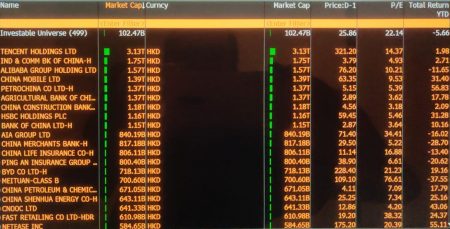Is ESG really making a difference in Hong Kong’s corporate landscape?
In recent years, environmental, social and governance (ESG) factors have gained prominence worldwide, as companies and investors increasingly recognise the importance of sustainable practices.
As a global financial hub, Hong Kong has a major role to play in this transformation. This article dives into the transformative impact of ESG in Hong Kong, shedding light on the initiatives, challenges, and opportunities that lie ahead in this dynamic city.
As market demand grows, embracing sustainability is no longer just an option – it’s a strategic imperative for businesses around the world. Hong Kong is no exception, and the Special Administrative Region has increasingly dedicated efforts to promote ESG.
The main interest behind Hong Kong’s ESG policy relies on a greater plan to maintain its position as a leading international financial hub. The efforts that have been dedicated to applying ESG standards are in fact related to pressure from international agreements, even when the region is not part of the concerned organisations.
What are the global concerns and evolutions?
Hong Kong’s regulatory authorities are currently placing significant emphasis on the environmental aspect of ESG criteria. The same approach has also been adopted by most leading markets.
This focus is mainly driven by two factors: the recognition of systemic risks associated with the climate crisis by international organisations, and the growing interest from both corporations and consumers to promote sustainability and transition towards a greener global economy.
The ESG strategy of Hong Kong is part of a wider project aimed at creating a sustainable and resilient future for the city. Hong Kong has set ambitious goals to promote sustainable development through different long-term policies.
| Biodiversity Strategy and Action Plan 2016-2021
The Biodiversity Strategy and Action Plan is a five-year national policy that evaluates biodiversity conditions in Hong Kong and the actions that different players in the city must take in order to preserve it.[1] The objective was to support sustainable development in an evolving way such that the policy could be modified according to current factors. ESG Steering Group The Government established an ESG Steering Group co-led by the Hong Kong Monetary Authority (HKMA)[2] and the Securities and Futures Commission (SFC)[3]. This group has set up a framework to enhance Hong Kong’s position as a leader in green and sustainable finance in Asia. They set out the objective to determine mandatory climate-related guidelines that should be aligned with the Task Force on Climate-related Financial Disclosures[4] by 2025. Climate Action Plan 2050 Following the Paris agreements of 2015, the Hong Kong government set into motion a Climate Action Plan in 2021 that aims to achieve carbon neutrality by 2050. This project, based on four major decarbonisation strategies, has indeed been a driver for corporate ESG regulations these past few years. Furthermore, the Hong Kong government announced that they would set up a new Office of Climate Change and Carbon Neutrality dedicated to coordinating zero-carbon emission goals with corporate responsibilities.[5] HKEX Consultation Paper 2023 Since 14 April 2023, the HKEX has published a consultation paper aiming to enhance climate-related disclosures in accordance with the International Sustainability Standards Board (ISSB).[6] This consultation paper is a step closer to the 2025 objective of aligning ESG standards with TCFD. The Exchange provided interim provisions for certain disclosures such as the scope of emissions of certain cross-industries or the financial effects of climate related risks for the first two reporting years following the effective date of 1 January 2024. |
What are the main ESG sources in Hong Kong?
The drivers for ESG in Hong Kong are:
Hong Kong Monetary Authority
HKMA added a new module to its Supervisory Policy Manual since December 2021 that instructed banks to develop risk management frameworks relating to climate risk.[7] The authority also requested that banks indicate their disclosures in alignment with Task Force on Climate-related Financial Disclosures (TCFD) by 2023.
Securities and Finance Commission
Since 2021, the SFC introduced obligations for fund managers who possessed risky climate-related investments to consider risk management processes and present appropriate disclosures.[8] Such requirements are essentially related to climate risk and do not cover the other ESG pillars.
Government Ordinances
There is a wide range of government ordinances which deal with each ESG pillar. Indeed, the subject is relatively vast and can touch upon various laws.
| Here are several examples of ordinances under Hong Kong law that are relevant to the subject:
Environmental: the ordinances related to the environmental pillar are directed at polluting industries to minimise the impact that the latter have on Hong Kong’s biodiversity.
Social: the social standard regroups employment and labour regulations as well as operating practices. The social aspect of ESG aims to monitor the activities all along the supply chain including employees.
Governance: governance defines the guidelines for good management in a cooperation. This implies effective and transparent leadership that guide the organisation to apply these ESG principles.
|
It is important to note that most of the ordinances relating to ESG in Hong Kong are quite old, with some of them dating back several years. While these ordinances have been revised and updated over time, it is worth acknowledging that they may not fully reflect the current state of sustainability practices and emerging environmental and social challenges. It is essential for the government to continually assess and update these ordinances to ensure they remain effective and aligned with evolving ESG standards.
Hong Kong Stock Exchange
Hong Kong is one of the first stock exchanges to require listed companies to report on their ESG practices. Under the Rules Governing the Listing of Securities on The Stock Exchange of Hong Kong Limited (“Listing Rules”), listed companies are subject to the requirements of:
- the Corporate Governance Code (Appendix 14 to the Main Board Listing Rules; Appendix 15 to the GEM Listing Rules) (“CGCode”): environmental and social aspects; and
- the Environmental, Social and Governance Reporting Guide (Appendix 27 to the Main Board Listing Rules; Appendix 20 to the GEM Listing Rules): disclosure on corporate governance aspects of the listed company.
Listed companies are therefore required to file an annual ESG report. Pursuant to the ESG Reporting Guide and the CG Code, listed companies are subject to “comply or explain” disclosures.
The “comply or explain” approach gives companies the opportunity to indicate whether they have complied with a specific provision of the ESG Reporting Guide or the CG Code, or to explain clearly and rationally why they have not complied. Regarding this obligation, the report issued by listed companies should cover the following areas:
| Environmental | Social | Governance |
| Emissions | Employment | Oversight of the board’s perception of ESG issues |
| Use of resources | Health and Safety | Management approach and strategy |
| The environmental and natural resources | Development and training | How the board reviews progress |
| Climate change | Labour Standards | |
| Supply chain management | ||
| Product responsibility | ||
| Anti-corruption | ||
| Community investment |
Companies are free to determine which areas or aspects are most relevant to their businesses for inclusion in their ESG reports. For instance, if an area or aspect / provision is considered not material to an issuer’s business, the issuer does not need to disclose this explicitly in the ESG report. However, they should explain in the report why no disclosure is made based on the immateriality to the business. Such explanation is sufficient to meet the “comply or explain” requirement.
Who are ESG regulations aimed at?
Unlisted companies
The Companies Ordinance mandates Hong Kong registered companies to prepare an annual directors’ report (Read our checklist on Annual report and accounts (private companies) for more details). Subject to relevant conditions, the report and the requirements apply to holding companies who have their subsidiary undertakings included in their annual consolidated financial statements for the financial year. They must then provide a business review[9].
Companies that meet certain specified criteria may qualify for simplified reporting and be exempted from the business review requirements that are generally applicable to public companies. For example, this could apply to private companies of a revenue or assets level below certain thresholds.
| Reporting obligations differ with the size of the company
SMEs Reporting SMEs are relatively low. Under section 359 of the Companies Ordinance private companies must fulfil a smallest size test in order to be eligible for reporting exemption. The smallest size tests for private companies are that they do not exceed at least two out of three of the following limits: (i) HK$100 million total annual revenue, (ii) HK$100 million total assets and (iii) 100 employees. Mid-size companies For companies that have not been exempt from annual reporting, schedule 5 of the Companies Ordinance provides specific guidelines that the Business Review should include: (i) the company’s environmental policies and performance; and (ii) the company’s compliance with the relevant laws and regulations that have a significant impact on the company; and (iii) an account of the company’s key relationships with its employees, customers and suppliers and others that have a significant impact on the company and on which the company’s success depends. |
Among the information that must be included in the annual report and the business review, some can be linked to the ESG pillars (e.g., discussion on the company’s environmental policies and performance; account of the company’s key relationships with its employees, that have a significant impact on the company and upon which the company’s success depends).
However, there is no specific, general ESG reporting requirement for companies other than listed companies. Listed companies are the only ones required to present an annual report on their commitment to ESG standards.
Hong Kong plays a strategic role in directing capital and investment towards green or sustainable finance. It is one of the largest stock exchanges in the world in terms of market capitalisation and is an international financial and asset management centre. As such, this underlines how important it is for listed companies to consider ESG standards, particularly when it comes to the environment. With thousands of companies and securities listed on the Hong Kong Stock Exchange, and many listed companies and issuers having activities and operations around the world, Hong Kong’s climate action and carbon footprint through these activities is particularly important.
| According to data provided by the World Federation of Exchanges, Hong Kong is the fourth largest stock exchange in Asia[10] and the seventh largest in the world[11], with an estimated market capitalisation of USD 4.1 trillion (HKD 32,1 trillion in local currency)[12]. |
However, the total number of listed companies in 2022 was only 2,597, while 104,120 new local companies were registered in the same year. The development of ESG standards for unlisted companies is therefore expected if Hong Kong really wants to be part of the ecological transition.
Listed companies

Listing Rules relating to ESG issues are evolving and economic players are being involved in the development process. For example, in 2023, a public consultation was held on new climate reporting proposals for listed companies[13].
Research carried out by the HKEX[14] shows that investors are increasingly interested in corporate governance and environmental and social activities. It demonstrated the importance for IPO applicants to seriously consider corporate governance and ESG issues at an early stage, in order to build the necessary mechanisms into the IPO process and disclose this information in the prospectus.
Although the signs are relatively encouraging, progress still awaits. Although listed companies are the main targets of ESG requirements, there are disparities in the extent to which ESG issues are considered and in the quality of the reports submitted.
Firstly, smaller listed companies sometimes have difficulties in approaching ESG issues in a strategic way. Indeed, they often suffer from a lack of ESG expertise and often do not have sufficient resources to enable them to fill these gaps.
Moreover, even if companies are required to use standardised metrics when disclosing relevant information relating to their ESG performance, they are free to determine which areas or aspects are most material to their businesses for inclusion in their ESG reports. Most listed companies in Hong Kong opt to address all of the aspects included in the Reporting Guide, raising concerns that they are taking a box-ticking approach.
Finally, a problem that can be identified is the reluctance of some listed companies to disclose their ESG information. They will then stick to the minimum in order to stay within the Listing Rules.
What is the outlook for ESG in Hong Kong?
| Focus
In a capital-raising operation involving one of our clients, the investor required the company to operate within its ESG policy. Our client has therefore undertaken to:
It shows how ESG principles can have a practical impact. |
While the effort for including ESG considerations as part of the corporate strategy is an indicator for evolution, there are several implications that can arise from this growing trend, as well as anticipated changes for the years to come:
- Directors’ liability: Today’s thinking is moving in the direction of greater responsibility for directors regarding ESG reports. They will be encouraged to ensure the quality and accuracy of all the information in the report.
- Regulatory and Legal Risks: As ESG practices gain prominence, regulatory frameworks and reporting requirements are evolving. Companies may face challenges in keeping up with changing regulations and ensuring compliance. Failure to meet regulatory requirements can result in legal risks, reputational damage, and potential financial penalties.
- Shareholder activism: Along with a growing interest for climate litigation comes a rise of climate activists. They could denounce activities at risk for corporations that they deem not sustainable enough. Shareholders can use their influence to push for companies to adopt more genuinely sustainable and responsible practices.
- Greenwashing accusations: This term refers to the criticism and allegations made against companies for engaging in deceptive or misleading practices that make them appear more environmentally-friendly. These accusations suggest that companies are using false or exaggerated claims about their environmental initiatives or products to appeal to consumers who prioritise sustainability.
Takeaways
- Hong Kong regulation has a growing interest in ESG standards that have been enforced through different organisations of the special administrative region (HKMA, SFC, Government Ordinances and HKEX).
- The companies who are the most concerned for ESG principles are listed companies that are required to submit an annual report regarding their ESG involvement alongside a set of standards.
- There are disparities in the extent to which ESG issues are taken into account by listed companies and in the quality of the reports submitted.
- The complexity of measuring and reporting ESG performance, the potential short-term financial impact, and the need for resource allocation pose hurdles that companies must address. Additionally, ensuring alignment with evolving regulatory frameworks and avoiding greenwashing practices are essential for maintaining credibility and trust.
[1] Hong Kong Biodiversity Strategy and Action Plan (2016-21), Agriculture, Fisheries and Conservation Department
[4] Task Force on Climate-related Financial Disclosures
[5] Hong Kong’s Climate Action Plan 2050, GovHK
[6] Enhancement of the Climate-related Disclosures Under the Environmental, Social and Governance Framework, HKEX
[7] Supervisory Policy Manual (Dec 2021), HKMA
[8] Consultation Conclusions on the Management and Disclosure of Climate-related Risks by Fund Managers
[9] Cap. 622 Companies Ordinance ─ Schedule 5 Contents of Directors’ Report: Business Review
[10] After Shanghai Stock Exchange (USD 6.5 trillion), Japan Exchange Group (USD 5.7 trillion) and Shenzhen Stock Exchange (USD 4.3 trillion)
[11] After stock exchanges such as NYSE (USD 25.4 trillion), Nasdaq (USD 20.5 trillion) or Euronext (USD 6.2 trillion)
[12] Market Statistics – Focus | The World Federation of Exchanges (world-exchanges.org)
[13] Exchange Publishes Consultation Paper on Enhancement of Climate Disclosure under its ESG Framework (hkex.com.hk)
[14] SEHK, Analysis of IPO Applicants’ Corporate Governance and ESG Practice Disclosure in 2020/2021, 2021 and HKEX, Analysis of ESG Practice Disclosure (“2022 Analysis”), 2022.



